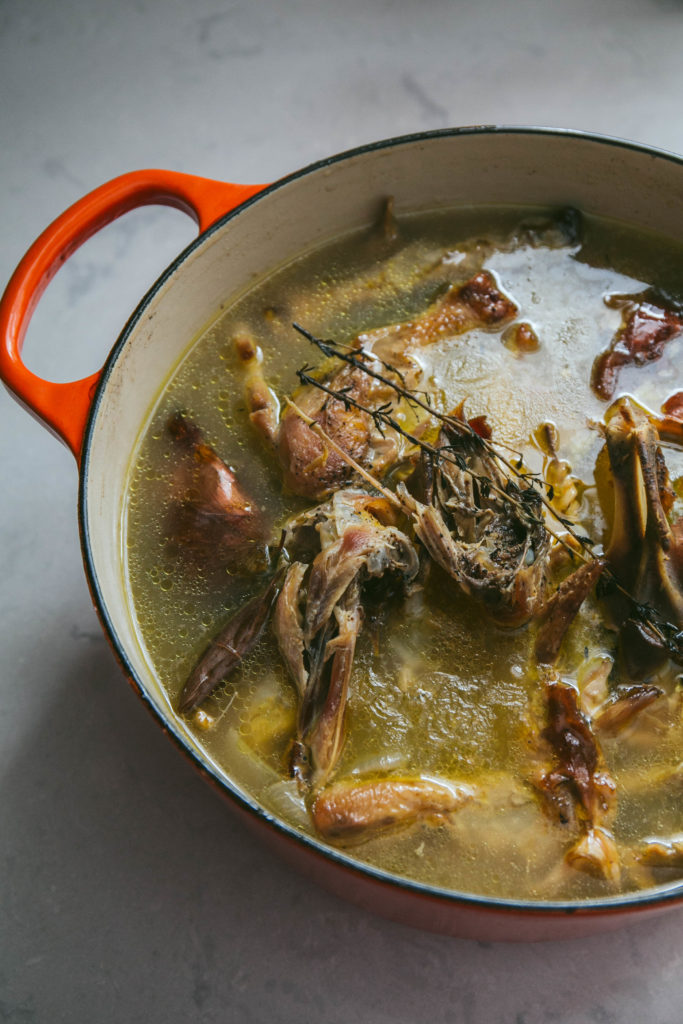Bone broth for infants: Soothing Support for Digestion
Wiki Article
The aImportance of Healthy Food: Why Bone Broth Is a Fantastic Selection for Babies
Bone broth stands out as a nutrient-dense alternative, supplying crucial vitamins and minerals that sustain growth and advancement. What are the best ways to present bone broth to your little one?Nutritional Benefits of Bone Broth for Infants
When you present bone broth to your infant's diet regimen, you're offering a nutrient-dense food that provides numerous wellness advantages. Packed with vital minerals and vitamins, bone broth includes calcium, magnesium, and phosphorus, which sustain your baby's growing bones. It's also rich in collagen, assisting in the growth of healthy and balanced skin, joints, and connective cells.Additionally, bone broth is an excellent source of amino acids like glycine and proline, which play a substantial role in overall development and muscular tissue growth. These nutrients aid advertise a solid immune system, establishing a strong foundation for your baby's wellness.
Furthermore, bone broth is simple to absorb, making it a gentle choice for your youngster. By incorporating this wholesome food into their meals, you're guaranteeing they receive important nutrients essential for their general wellness. Go in advance and make bone broth a staple in your baby's diet plan!
Exactly How Bone Broth Supports Digestion
Bone broth is loaded with essential nutrients that can really benefit your infant's food digestion. It advertises intestine health and wellness and helps with nutrient absorption, making it a great addition to their diet. By including bone broth, you're setting the phase for a healthier gastrointestinal system.Nutrient-Rich Composition
One of the most nutrient-rich foods you can introduce to your baby's diet is bone broth, which is packed with important minerals and amino acids that sustain healthy food digestion. Rich in collagen, bone broth helps reinforce your child's gut cellular lining, making it less complicated for their body to soak up nutrients. By including bone broth into your baby's meals, you're providing them a wholesome food that nurtures their digestion system efficiently.Promotes Gut Wellness
As you introduce bone broth right into your infant's diet plan, you'll discover it not just nourishes yet likewise advertises gut health and wellness effectively. Rich in jelly, bone broth assists relieve the gastrointestinal tract, reducing inflammation and supporting a healthy digestive tract lining. In addition, the amino acids located in bone broth, such as glycine, help in food digestion and can help protect against typical belly troubles.Aids Nutrient Absorption
Presenting bone broth not just supports intestine wellness but additionally plays a significant role in assisting nutrition absorption. When you provide your infant bone broth, you're offering an abundant resource of minerals and amino acids that improve their digestive system processes. The jelly in bone broth aids to soothe the intestine cellular lining, enhancing its capacity to absorb vital nutrients.Enhancing the Body Immune System With Bone Broth

Furthermore, bone broth has glycosaminoglycans, like glucosamine, that can improve the immune system's capability to work effectively. This means it not just helps in building defenses yet also aids in recovery from ailments. By integrating bone broth into your baby's diet plan, you're supplying an all-natural source of sustenance that promotes health. So, take into consideration making bone broth a staple in your baby's dishes, as it can play an essential function in their immune health and wellness and development.
Easy Ways to Incorporate Bone Broth Into Infant's Diet
Including bone broth into your child's diet can be simple and rewarding. Beginning by blending a percentage of bone broth right into pureed veggies or fruits. This includes taste and nutrients without overwhelming your child. You can likewise utilize bone broth as a base for soups or stews that you plan for the family members, ensuring your child gets a preference of delicious, well balanced meals.If your baby appreciates grains, think about cooking rice or quinoa in bone broth rather of water for additional nutrients. These techniques will certainly help your infant reap the benefits of bone broth effortlessly!
Homemade vs. Store-Bought Bone Broth: What to Select
Which is better for your baby: homemade or store-bought bone broth? Homemade bone broth supplies you complete control over the active ingredients. You can choose high-quality bones, natural veggies, and natural herbs, guaranteeing your infant gets the most nutrients without where to get bone broth additives or preservatives. And also, making it at home can be a fulfilling experience, enabling you to bond with your baby while preparing wholesome food.On the other hand, store-bought alternatives are hassle-free and conserve you time. Nonetheless, they frequently include preservatives and might not match the depth of flavor and nourishment you obtain from homemade broth. If you choose store-bought, look for brands that are natural and without ingredients.
Eventually, if you have the time and sources, homemade bone broth is the superior selection for your infant's health and wellness. If you're short promptly, select a top quality store-bought choice as a backup.
Age-Appropriate Bone Broth Serving Pointers
As your infant grows, it's crucial to customize bone broth serving recommendations to their developing stage. For infants around 6 months, start with a couple of spoonfuls of watered down bone broth (organic bone broth).As soon as your child reaches around eight months, you can serve it cozy in a sippy mug or add it to soft foods like purees. By the time your child is around a year old, think about supplying bone broth as a standalone beverage or blending it into soups and stews. Just make certain to keep the broth low in salt. Always keep an eye on for any reactions, and consult your pediatrician if you have problems about presenting brand-new foods. Enjoy this nutritious addition to your infant's diet regimen!
Other Healthy And Balanced Foods to Combine With Bone Broth for Infants
When you're aiming to improve the nutritional value of bone broth for your infant, take into consideration combining it with nutrient-dense veggies like carrots and spinach. Entire grain choices, such as quinoa or brownish rice, can also include texture and fiber. In addition, including healthy protein sources like shredded chicken or lentils will certainly round out the dish nicely.
Nutrient-Dense Vegetables
Nutrient-dense vegetables are a superb addition to bone broth for infants, improving both taste and nourishment. Integrating veggies like carrots, spinach, and pleasant potatoes can improve the nutrient content of your broth. Carrots give beta-carotene for healthy vision, while spinach is packed with iron and calcium, necessary for development. Pleasant potatoes include natural sweet taste and are rich in fiber, assisting digestion.You can quickly blend these veggies into the broth or offer them as soft, prepared items alongside it. This not only introduces new flavors yet also urges your kid to delight in a selection of nutrients. By pairing nutrient-dense vegetables with bone broth, you're laying the foundation for a healthy diet plan right from the beginning.
Entire Grain Options

Healthy Protein Resources
Bone broth pairs splendidly with numerous healthy protein resources, additionally boosting your infant's diet. Attempt adding soft, prepared lentils; they're nutrient-dense and jam-packed with protein. You can also mix in shredded chicken or turkey, which are very easy for your kid to digest. If you're seeking plant-based alternatives, take into consideration mashed tofu or pureed chickpeas-- both give excellent healthy protein without overwhelming tastes. Eggs, when presented safely, are one more terrific selection; they're flexible and loaded with nutrients. Inevitably, assimilating some well-cooked quinoa can add a nice structure and extra protein. By integrating these healthy protein sources with bone broth, you're offering your infant a balanced, nourishing dish that sustains their growth and advancement.Frequently Asked Concerns
Can Bone Broth Cause Allergies in Newborns?
Yes, bone broth can create allergic reactions in infants, specifically if they're delicate to certain active ingredients. Constantly consult your pediatrician before introducing brand-new foods and screen for any signs of allergic reactions after feeding.Just How Should Bone Broth Be Stored for Infants?
You should keep bone broth in closed containers, either in the refrigerator for up to a week or in the fridge freezer for as much as three months. chicken bone broth. Constantly thaw it effectively before serving to your infantIs It Safe to Give Bone Broth to Premature Babies?
It's necessary to consult your doctor prior to presenting bone broth to early babies. They'll evaluate your infant's specific health and wellness needs and guarantee it's secure, considering their unique nutritional requirements and developing phase. Always focus on experienced suggestions.What Are the Indicators of Intolerance to Bone Broth in Infants?
When presenting bone broth, look for indications like fussiness, breakout, looseness of the bowels, or vomiting. If your child reveals any of these responses, it's best to speak with a pediatrician prior to remaining to supply it.Can Bone Broth Be Utilized as a Meal Replacement for Newborns?
No, you should not utilize bone broth as a meal substitute for infants. It lacks important nutrients required for their growth. Instead, include it into their diet together with balanced dishes for included nutrition and flavor.Report this wiki page